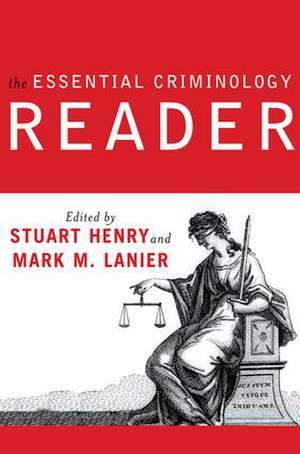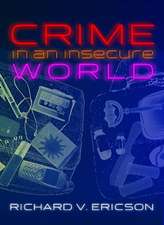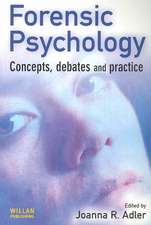The Essential Criminology Reader
Autor Stuart Henry, Mark M. Lanieren Limba Engleză Paperback – 5 aug 2005
| Toate formatele și edițiile | Preț | Express |
|---|---|---|
| Paperback (1) | 462.65 lei 6-8 săpt. | |
| Taylor & Francis – 5 aug 2005 | 462.65 lei 6-8 săpt. | |
| Hardback (1) | 1000.27 lei 6-8 săpt. | |
| Taylor & Francis – 13 iun 2019 | 1000.27 lei 6-8 săpt. |
Preț: 462.65 lei
Preț vechi: 544.30 lei
-15% Nou
Puncte Express: 694
Preț estimativ în valută:
88.53€ • 94.67$ • 73.81£
88.53€ • 94.67$ • 73.81£
Carte tipărită la comandă
Livrare economică 17 aprilie-01 mai
Preluare comenzi: 021 569.72.76
Specificații
ISBN-13: 9780813343198
ISBN-10: 0813343194
Pagini: 396
Dimensiuni: 156 x 234 x 25 mm
Greutate: 0.5 kg
Ediția:1
Editura: Taylor & Francis
Colecția Routledge
Locul publicării:Oxford, United Kingdom
ISBN-10: 0813343194
Pagini: 396
Dimensiuni: 156 x 234 x 25 mm
Greutate: 0.5 kg
Ediția:1
Editura: Taylor & Francis
Colecția Routledge
Locul publicării:Oxford, United Kingdom
Cuprins
1. Classical and Rational Choice Theories * 1.1 Free Will and Determinism? Reading Beccarias Of Crimes and Punishments (1764) as a Text of Enlightenment, by Piers Beirne * 1.2 Rational and Situational Choice Theory, by Derek B Cornish and Ronald V. Clarke 2. Biological and Biosocial Theories * 2.1 Cesare Lombroso and the Origins of Criminology: Rethinking Criminological Tradition, by Nicole Rafter * 2.2 Integrating Findings from Neurobiology into Criminological Thought: Issues, Solutions, and Implications, by Diana Fishbein 3. Psychological Theories * 3.1 Forty Years of the Yochelson/Samenow Work: A Perspective, by Stanton E. Samenow * 3.2 Contributions of Community Psychology to Criminal Justice: Prevention Research and Intervention, by Sarah Livsey and William S. Davidson II 4. Social Learning and Neutralization Theories * 4.1 Social Learning Theory: Correcting Misconceptions, by Christine S. Sellers and Ronald L. Akers * 4.2 Techniques of Neutralization, by W. William Minor 5. Social Control Theories * 5.1 Social Control and Self-Control Theory, by Travis Hirschi and Michael Gottfredson * 5.2 Social Control Theory and Direct Parental Controls, by Joseph H. Rankin and L. Edward Wells 6. Social Ecology and Subcultural Theories * 6.1 Social Ecology and Collective Efficacy Theory, by Robert J. Sampson * 6.2 Gangs as Social Actors, by John M. Hagedorn 7. Anomie and Strain Theories * 7.1 General Strain Theory, by Robert Agnew * 7.2 The Origins, Nature, and Prospects of Institutional-Anomie Theory, by Richard Rosenfeld and Steven F. Messner * 7.3 Global Anomie Theory, by Nikos Passas 8. Conflict and Radical Theories * 8.1 Criminology and Conflict Theory, by Austin T. Turk * 8.2 The New Radical Criminology and the Same Old Criticisms, by Michael J. Lynch and Paul B. Stretesky 9. Feminist and Gender Theories * 9.1 Feminist Thinking About Crime, by Kathleen Daly * 9.2 Masculinities and Theoretical Criminology, by James W. Messerschmidt 10. Postmodernist and Critical Culture Theory * 10.1 Postmodernist Theory and Criminology, by Bruce Arrigo * 10.2 Edgework: Negotiating Boundaries, by Dragan Milovanovic * 10.3 Cultural Criminology, by Jeff Ferrell 11. Anarchist, Peacemaking, and Restorative Justice Theories * 11.1 Needs-Based Anarchist Criminology, by Larry Tifft and Dennis Sullivan * 11.2 Peacemaking, by Hal Pepinsky * 11.3 Reintegrational Shaming, by John Braithwaite, Valerie Braithwaite, and Eliza Ahmed 12. Left Realist Theory * 12.1 Inequality, Community, and Crime, by Elliott Currie * 12.2 Left Realist Theory, by Walter DeKeseredy and Martin D. Schwartz 13. Integrative Theories * 13.1 The Integrated Systems Theory of Antisocial Behavior, by Matthew Robinson * 13.2 Applying Integrated Theory: A Reciprocal Theory of Violence and Nonviolence, by Gregg Barak * 13.3 Criminologist as Witness, by Richard Quinney
Descriere
Initially designed to accompany Mark Lanier and Stuart Henry's best-selling Essential Criminology textbook, this new reader is an up-to-date companion text perfect for all students of introductory criminology and criminological theory courses.










